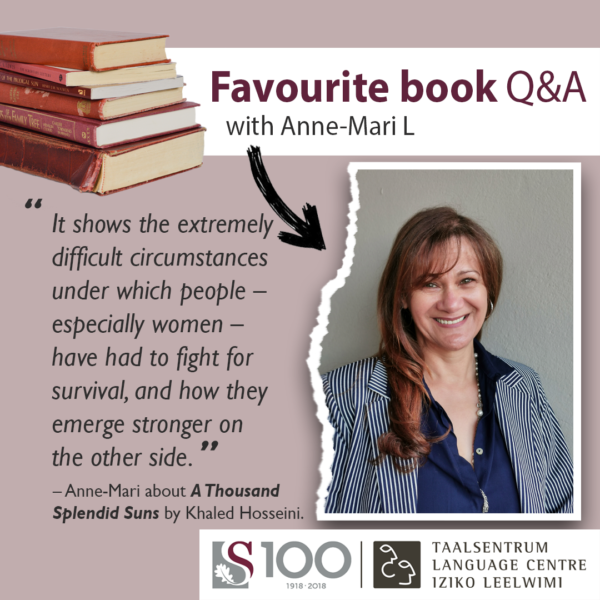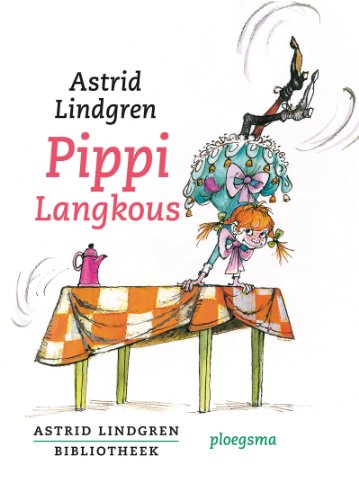
Get to know us through the books we read! This month we chat to Anne-Mari Lackay of the Writing Lab. Anne-Mari has been working at the Writing Lab since 2001, where she coordinates Writing Lab consultations and serves as a link between the Writing Lab, students, writing consultants, lecturers and other staff members.
“I think that because I also had to study and work under difficult circumstances, my own experiences made me more sensitive to students’ needs. It is important to me to assist them with empathy and to try making things easier for them. I will always stand up for the underdog – the person who gets the short end of the stick – and try to inspire and empower people to help themselves to fulfil their ideals.”
What is the title of your favourite book, or a book that left a deep impression on you, or a book that you found unforgettable for some reason or another?
Although I love reading, I haven’t read something for relaxation in quite a while. One of the books I managed to finish reading without too many interruptions was A Thousand Splendid Suns by Khaled Hosseini. It is a heart-wrenching story – so authentic and true to human nature, but it tells us about a reality of which many women in areas controlled by the Taliban can testify. The book made a deep impression on me. I actually felt as if I was fighting those women’s battle alongside them. It was sad to see how those women’s circumstances caused unnecessary friction between them. Eventually they could unite to find a way out despite the unbelievable pain and humiliation.
Why did this book make such an impression on you?
The book had been given to my daughter before she became seriously ill and doctors had to fight to keep her alive. When I started reading it, it was a kind of escape. The book brought home to me the extremely difficult circumstances under which people – especially women – have had to fight for survival, and how they emerge stronger on the other side. Who, then, am I not to tackle my challenges and to make the best of whatever life throws at me? I was able to cry and to rejoice about small victories with the people I got to know.
The book is set in Afghanistan and reflects the hardship and suffering of women in areas controlled by the Taliban. The author describes the surroundings and events incredibly well, so that one can vividly see the story unfolding in one’s mind’s eye. As I had visited Istanbul previously, the book really resonated with me. It made me grateful once again about the way in which we live in our towns and houses here in our country, despite the crime and corruption.
Who is your favourite author? Also tell us why?
I don’t have one specific favourite author. Authors who open the world for me appeal to me.
Hosseini’s books attract me because they have opened another world for me. I have also read his book The Kite Runner and it had the same impact on my soul as A Thousand Splendid Suns. I prefer authors who can offer me new experiences, and I like reading stories where people who have been hurt and rejected are able to overcome their difficult circumstances and escape back into the sunlight.
Another author whose writing style I like, is John Grisham. In his book The Confession a young black soccer star is found guilty, without sufficient evidence, of murdering a young girl. It is a heart-breaking story where preconceived notions about colour play a role and lead to a young man having to wait for years in prison for his execution. Shortly before his hanging, the guilty person came to the fore and admitted guilt. Unfortunately, no one believed him and the innocent man was still hanged.
I also like authors in the field of psychology who encourage one to do introspection and who help with self-examination. I like guidelines for self-empowerment, such as those provided by Daniel Goleman in Emotional Intelligence. One can take your time reading this book and learning from it.
I have also started reading more about the lives and history of poets and authors like Breyten Breytenbach, Diana Ferrus and Adam Small. I have met the first two in person – this makes it even more special to read about them. They write about apartheid and their respective origins and life journeys. It also made me realise that one’s own story is important and deserves to be written down and read. Dr Diana Ferrus has just been awarded an honorary doctorate in philosophy by Stellenbosch University.”
What are you reading at the moment?
I’m currently reading Brutal Legacy by Tracy Going, but it is taking me quite a long time – I put it down when it becomes too sad. I’m also reading Noel O’Reilly’s Wrecker – not really my kind of book. It’s a story about strange people who do strange things. Nonetheless, there are some interesting moments. The people’s customs and their way of talking entice me to continue reading. In addition, I’m busy with two volumes of poetry – Donkerberg/Bloodwood by Dominique Botha and Wonderlike Woorde en Dade by Gameeda Henry (one of our local poets in Pniël).
Do you have a preference: reading physical books with paper pages or on a Kindle or other electronic platform? Why do you say so?
I prefer a printed book. My eyes are definitely not what they used to be and I sit in front of a computer all day long. I want to be able to feel, smell and see my book; to turn the pages, and to put it down and pick it up again.
What book have you re-read? Also tell us why?
I would like to read A Thousand Splendid Suns again – or at least parts of it – one day when I have time. One sometimes forgets exactly what happened, or when reading a book the second time you notice something you had previously interpreted differently.
Who is your favourite literary character?
As a child my most loved young literary character was Pippi Longstocking – and that will never change.”
Dont laugh at me! Pippi Longstocking is a remarkable little girl – exactly the way I would have liked to be at that stage of my life in the small town where I grew up. An independent, strong little person who tackled the world with all her might. No one could control her. Pippi was clever and fearless and she could do everything she set her heart on. Not even the important police could wield power over her. She believed in herself. No one was as strong as she was!
Roald Dahl’s Matilda also made a lasting impression on me: the little girl who was extremely intelligent and who sought to escape from her monotonous circumstances by reading books. She discovered that she had supernatural powers, which she used to deal with and resolve difficult situations. Of course, all of us would have liked to have supernatural powers to fix everything, put everyone in their place, and overcome difficult situations.
I think characters such as these build one’s personality. Today I still don’t like being pressured to do things. It brings my Pippi manners or supernatural powers to the fore …
Have you perhaps learnt a life lesson from a book or character that you would like to share with us, if this hasn’t come up in one of your answers already?
One learns so many life lessons. Tracy Going’s Brutal Legacy helped me to realise that courage and strength are within oneself; that, although things sometimes seem to be impossible and lost, one sometimes has to dig deeply to find that courage, but that it is always there.
Something else that made an impression on me, was when Cathy Park Kelly – I met her in person – explained the meaning of the title of her book, Boiling a Frog Slowly. She compared the painful experiences she had had in life with the reaction of a frog thrown into a pot of boiling water. In such a case, the frog would immediately jump out of the pot, but she is of the opinion that when the water in the pot containing the frog is heated gradually, the frog’s skin adapts to the increasing heat until the frog eventually boils to death. Similarly, a human being can adapt to the most difficult circumstances – in her case, abuse and gender-based violence – but such adaptations often are a survival strategy that could unwittingly destroy one and cause burnout. Her book helped me to begin understanding why women allow their husbands to abuse them and why they are sometimes unable to see a workable way out. The same principle applies to other situations in life to which one gets accustomed without realising how they sweep you away.
When I read the poems of Adam Small and Diana Ferrus, I get insight into the stories of their lives. During the apartheid years, the talented poet Adam Small waged a painful battle against the many injustices he experienced because of being labelled ‘Coloured’ by the authorities. He received acknowledgement for his work only after his death. This also applies to the poems of Breyten Breytenbach, who waged his own battle against apartheid.
From the work of Diana Ferrus (and other poets) I learnt, among other things, that it is only when one is older that you understand why certain things happened the way they happened.Things that upset or hurt you when you were a child get a new meaning now, and you are able to see and understand them in a new light. You also understand, with compassion, the actions of your parents and people around you. This made me realise that everyone’s story is important, and that other people who are confronted with the same circumstances can learn from one’s story.”
What book or books would you recommend to your students, friends or anyone else?
At the moment my small bookshelf contains a few books about the abuse of women. They might not be the kind of books you would want to read every day, because their contents are too painful, or sometimes one does not want to know about these painful things. To me it is especially sad to think that it took these authors years to walk away from the abuse and to be able to write about it. I think there are some men who still need to summon up the courage to do so as well.
My list is:
- Boiling a Frog Slowly by Cathy Park Kelly
- Brutal Legacy by Tracy Going
- A Thousand Splendid Suns by Khaled Hosseini
- The Confession by John Grisham
The pandemic gave me time to read more poems and to start writing myself. Some poems are easily understood; in others one has to search for the meaning. Poets write about the past, but also about what is happening now. Sometimes it is difficult to reconcile these two themes in oneself.
If our readers would like to know more about the village of Pniël where I live, they should read the volume of poetry Voetspore (a Pniël anthology). It was written by authors from the village, and tells more about life in Pniël and the customs there.



